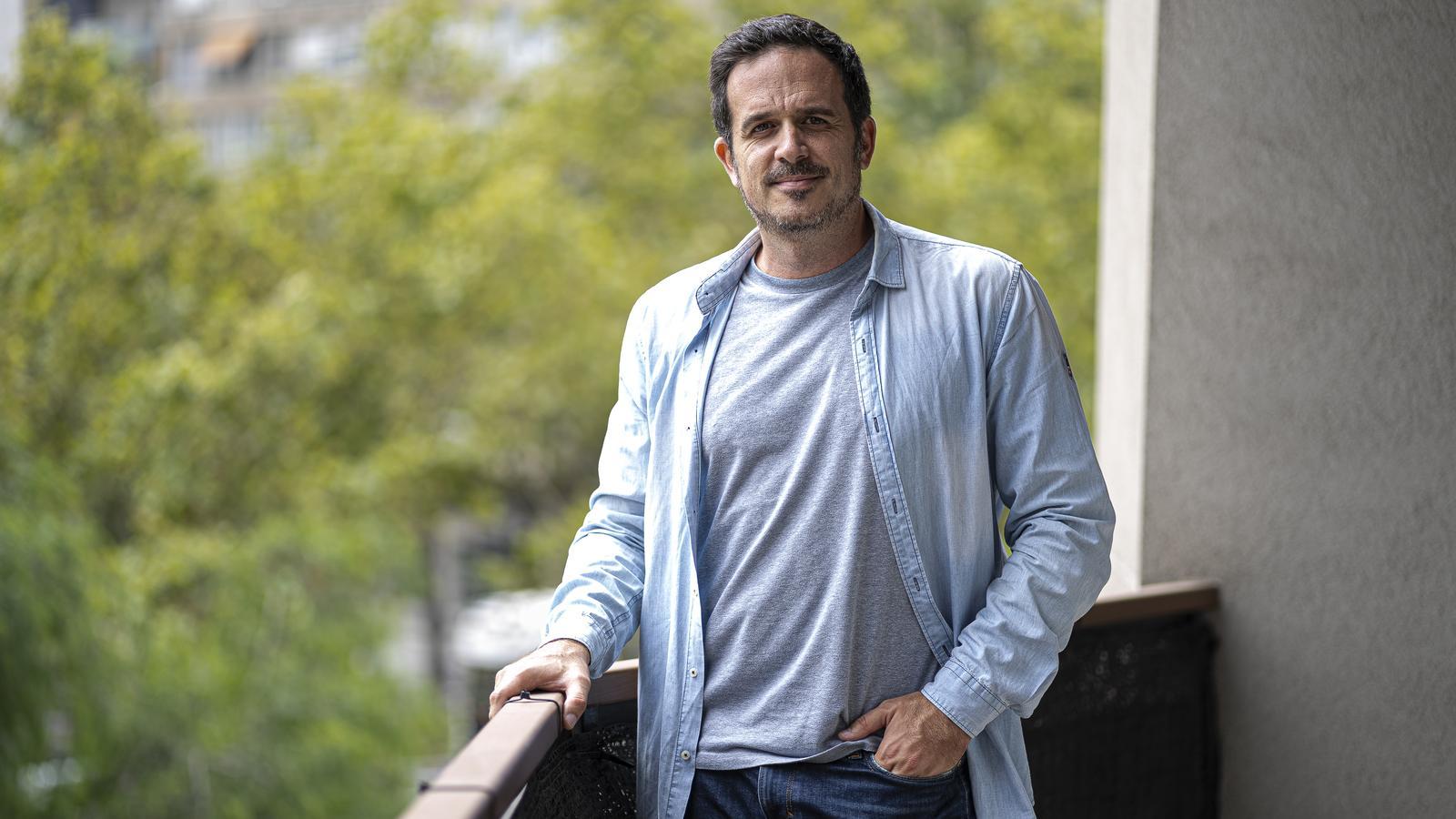Francesc Garriga: "The last few months in the US have been very toxic, and it's been a great experience for me to get away from them."
Presenter of 'The Afternoon of Catalunya Ràdio'


BarcelonaAfter four years as a correspondent in the United States, Francesc Garriga (Súria, 1983) takes on the challenge of leading The afternoon of Catalunya Ràdio, the public broadcaster's afternoon magazine that rivals the RAC1 version, of Toni Clapés, undisputed leader of the range.
He's been doing it for two weeks now The afternoon of Catalunya RàdioDo you remember what you thought when you were offered the program?
— I thought it was a difficult challenge, but it was also a good opportunity to leave something I really enjoyed, which was being a correspondent, and be able to return to something very interesting. It was a mix of "Wow, how complicated" and "Wow, what an opportunity."
Last year he made the summer edition ofThe morning of Catalunya Ràdio, and with his work as a correspondent in the United States, he has become more well-known to the public. These two factors have been essential when it came to being offered The afternoon of Catalunya Ràdio?
— We should ask the management about that, but I do think it's helped me a lot. Five years ago, I was basically someone who talked about Barça, with a TV show, The Eleven, and it was hard to get it out of there. Five years later, that's no longer the case, because the public has discovered that I spent four years working as a correspondent, and that, moreover, last summer it went quite well. Before making The morning of Catalunya Ràdio Last summer, I might not have dared to come and spend the afternoon. Two years ago, I don't know if I would have accepted the proposal.
How many times have you been asked about Toni Clapés, since you decided to accept doing The afternoon of Catalunya Ràdio?
— In every conversation, in every conversation. I can't add anything about Clapés that hasn't already been said, and that the numbers don't explain. He's a person I appreciate and, above all, value professionally. The funny thing is that, if I'm not mistaken, the first time I set foot in a Catalunya Ràdio studio was during a contest on Toni Clapés's show. It must have been in 1999, for Barça's centenary. He hosted a contest with Barça supporters' clubs on Saturdays, and when I was 15 or 16, I came to participate with the Súria Barça supporters' club. For me, Toni Clapés is also part of my soundtrack and he's someone who's been hosting the same show for many years and is a ratings leader. I'm not here to compete with Toni Clapés; I'm here to put on a good show. And like last summer, the goal is for people to listen to Catalunya Ràdio and say, "Wow, that's good, it's a program worth watching." And if perhaps the EGM right now tells us that there is a certain distance, at least get people to see that there is an alternative, and that we are working to, hopefully, make a overtaking and be audience leaders.
What would you like the Garriga label to be?
— My goal is to create something that people feel close to. I want them to feel like someone who speaks normally and has a tone that's somewhere between friendly and sarcastic, but who's also capable of it when it comes to being serious. In the afternoon, from four to seven, you'll hear everything that's happening on Catalunya Ràdio. I really like talking to the listeners; it's something I've been missing because when you're a correspondent, you just send a message. The stamp of closeness, friendliness, a certain optimism, and a desire to have a good time should be a bit of the show's trademark.
He talked about being serious when necessary. In 2021, when he was presenting The Eleven, wrote a powerful editorial about attacks against the LGBTQ+ community. Why did you think it was important to do so at the time?
— For many reasons. First, because it was a brutal murder [Samuel Luiz Muñiz was the victim of a homophobic murder in A Coruña] and also because we had accumulated three or four incidents in quick succession, some of them in Barcelona. I thought it wasn't out of place to say it on a program where perhaps someone wouldn't expect it, a football program where these discourses aren't so common, at least five years ago. I didn't do anything out of the ordinary, but it did generate some surprise. I thought it was important to write an editorial against homophobia to show that it's not just an issue of the groups that carry a flag and demonstrate. It's not about groups, it's about everyone. If a football program goes out and says, "Hey, what's happening is a lot," heavy"Perhaps someone who had missed the news realizes that these issues affect everyone.
Do you think it's important for presenters and journalists to take a stand?
— I think it's part of the job to be clear about what values you want to convey on a show. I would differentiate between who hosts a show and who covers the news. I don't think it has so much to do with whether you're conservative or progressive, but rather with human rights and respect for people. I understand that everyone has the right to go, do, think, and say whatever they want as long as it doesn't infringe on the rights of others. When faced with certain discourses, we must approach our programs to defend what we believe are the minimum standards for a society. I'm not the only one who decides this. There's a house style guide that also influences you somewhat. I also don't think we have to be writing editorials every day telling listeners what's right and what's wrong.
After being involved in sports for so long and having been a correspondent, what area of news appeals to you most?
— My obsession was the American elections, and if there had been an election year this year, 2025, I wouldn't have returned. I'm obsessed with the American elections, and even more so now that I've been able to see them up close and report on them. Sometimes, when you see things up close, they disappoint you, but I found it fascinating.
American politics has enjoyed it, but has it also suffered?
— Both. This is like a relationship, where you have a great time, but it also has difficult moments. The thing is, in this case, if it were a romantic relationship, the last few months have been very toxic, and it's been good for me to distance myself from that toxicity. So far, the most brutal professional experience has been from January to November, starting in Iowa with the primaries and ending with the election in which Trump is elected. Right now, American politics is at a very brutal level of toxicity, and I think it will continue to be that way from then on. I remember the night before the election, waiting in line to get into Trump's rally at 5:00 a.m., thinking, "I need this to be the last time I hear him speak; I can't take it anymore." It wasn't like that. The last eight months have been tough because the intensity and volume of lies, and especially the filth that comes from his words, the contempt for those who aren't what he wants them to be or those who don't think like him, has been difficult for me to handle.
So, was it the best time to leave?
— Yes, yes, sure.
Maybe because it's the worst time to live in the United States?
— Yes, I think it's the worst time to live in the United States. And my life personally wasn't difficult. As a citizen, I've always been respected, treated very well, and I've never had any problems at Trump's rallies. The day-to-day work was hard, and now you didn't feel as comfortable doing your job because you had to listen to a person with whom you had to constantly think about whether what he was saying was true or not, or whether he was contradicting himself. It made me uncomfortable to see how Trump insulted and abused trans people, immigrants who don't have rights... There were times during these eight months that I've been living with Trump when I said, "I can't take it anymore."
You've followed American politics a lot, but you've also been to the Oscars, for example. Do you have a bit of a celebrity soul?
— I discovered it there! I'd never been to the Ballon d'Or, and yet I've been to the Oscars three times. I mean, the United States has that advantage: you can be queuing up at five in the morning to see Donald Trump and get bored listening to Trump, or Biden, or Kamala Harris, but then you can also go to the Oscars. If you'd told me fifteen years ago I'd be going to the Oscars, I wouldn't have believed it.
When you said goodbye to the United States, you said the experience had changed your life. How has it changed you?
— Everything. Before I left, Antoni Bassas warned me. He said: "You don't realize it now, but when you return, your profile will have changed completely. You'll be able to do many other things. It will change your life." And I've returned, and I think he was absolutely right. I also think it's changed my view of the world. I'd always played sports, and there were topics I knew about because I saw them on TV. Going to the Mexican border and talking to the Venezuelan immigrants there changed my life. Suddenly, you stop seeing numbers and you see these twenty-five-year-old kids who will be sleeping on the streets while you'll be sleeping in an American hotel. For me, crossing into the United States was literally five minutes, and for them, it was the dream of a lifetime. Now that we talk so much about immigration, even at home, I'm much more sensitive to listening to these people who arrive here with nothing. If we talked to them for five minutes, outside of stereotypes, outside of political speeches, and asked them where they came from, how they got here, and what they want to do, it would change our perspective a lot.
In your farewell, you also mentioned that you would one day return to live in New York. What would you like to do?
— I don't know. Before becoming a correspondent in the United States, for several years I would spend a week in the summer in New York and imagine myself living there. But I still have to live there for a while. Now, I don't know how this will work, because I'm unlikely to be a correspondent in the United States again, and if I am, it will hardly be in New York. What will I do in New York? If I don't win the lottery and go on a sabbatical there like celebrities do, I find it difficult. For now, I'm still planning on living in Manhattan for a while and always trying to make it a 30th floor...
Why so high?
— Because I really like it. I'm very afraid of heights in open spaces, but in buildings I love them. Now that I've traveled around the United States, whenever I went to hotels I would ask for "highest possible floor(the highest possible floor).
